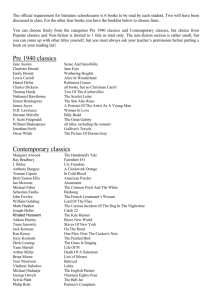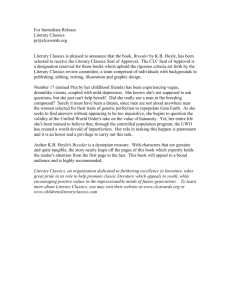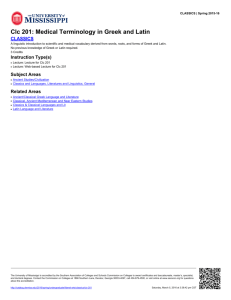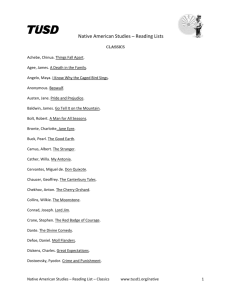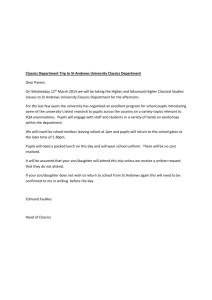View/Open
advertisement
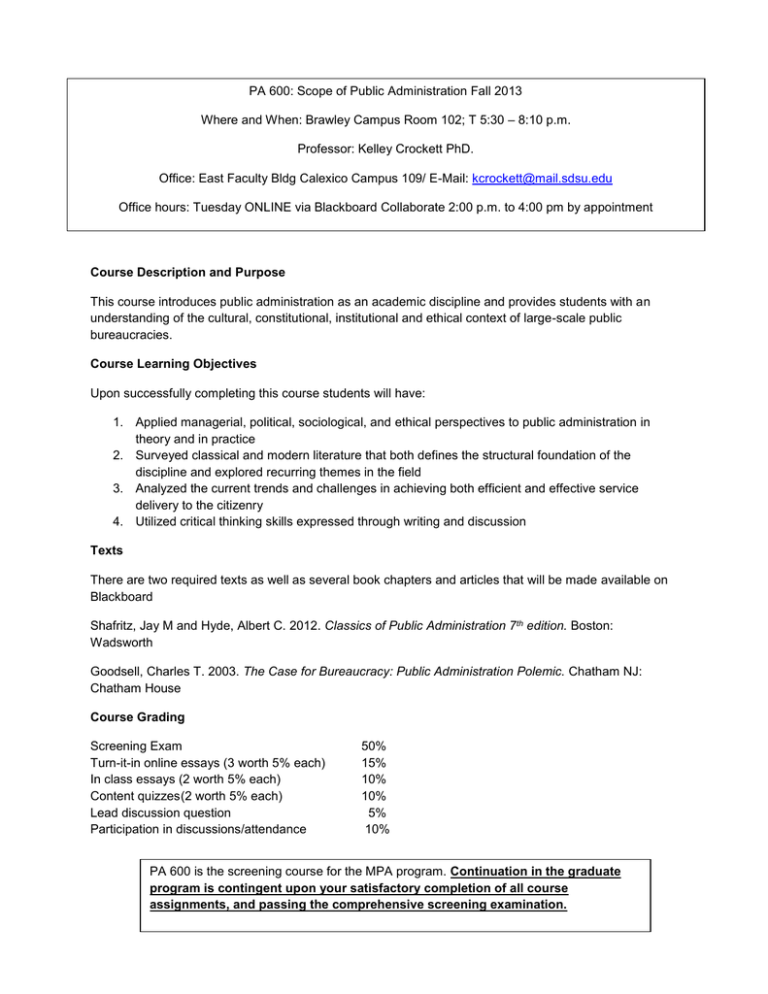
PA 600: Scope of Public Administration Fall 2013 Where and When: Brawley Campus Room 102; T 5:30 – 8:10 p.m. Professor: Kelley Crockett PhD. Office: East Faculty Bldg Calexico Campus 109/ E-Mail: kcrockett@mail.sdsu.edu Office hours: Tuesday ONLINE via Blackboard Collaborate 2:00 p.m. to 4:00 pm by appointment Course Description and Purpose This course introduces public administration as an academic discipline and provides students with an understanding of the cultural, constitutional, institutional and ethical context of large-scale public bureaucracies. Course Learning Objectives Upon successfully completing this course students will have: 1. Applied managerial, political, sociological, and ethical perspectives to public administration in theory and in practice 2. Surveyed classical and modern literature that both defines the structural foundation of the discipline and explored recurring themes in the field 3. Analyzed the current trends and challenges in achieving both efficient and effective service delivery to the citizenry 4. Utilized critical thinking skills expressed through writing and discussion Texts There are two required texts as well as several book chapters and articles that will be made available on Blackboard Shafritz, Jay M and Hyde, Albert C. 2012. Classics of Public Administration 7th edition. Boston: Wadsworth Goodsell, Charles T. 2003. The Case for Bureaucracy: Public Administration Polemic. Chatham NJ: Chatham House Course Grading Screening Exam Turn-it-in online essays (3 worth 5% each) In class essays (2 worth 5% each) Content quizzes (2 worth 5% each) Lead discussion question Participation in discussions/attendance 50% 15% 10% 10% 5% 10% PA 600 is the screening course for the MPA program. Continuation in the graduate program is contingent upon your satisfactory completion of all course assignments, and passing the comprehensive screening examination. 1 Course Requirements Student preparation and participation is mandatory. Excessive absences, late arrivals or leaving early, lack of reading, lack of participation during in class and online discussions will result in an inability to satisfactorily master the content of the class. Students are required to write three, no longer than 3 page papers, and turn them in online. They will also be required to write two, no longer than 3 pages each, inclass essays. Students will also be responsible to lead an in class discussion answering previously assigned questions on a single reading and will participate in two online discussion forums. There are two (5 questions open book) content quizzes based on the content assigned for that night. The final is the comprehensive screening exam. Papers Students are required to write three 3 page papers. The first paper is due on September 17th. Your second and third papers will be prepared in anticipation of the topic being discussed. Students may choose which question/week to turn in their second and third papers based on the schedule below. This builds a bit of flexibility in for you and eliminates any papers being late. Papers must be submitted electronically by 4:00 p.m. on the due date. LATE PAPERS ARE NOT ACCEPTED. You may submit your papers earlier than the due date, though if you receive a poor grade you may not make it up with another paper later. Papers will be turned into Blackboard using the turn-it-in plagiarism identification program. Students are responsible for original writing and must cite source (assigned class readings) documents at least twice in each paper. Students may not copy from or reference the instructor’s power point presentations. Students will be responsible for answering the assigned question concisely. In other words, please answer all parts of the question with some support for your points from the literature assigned. Do NOT merely summarize the articles. Do NOT overdo the quoted material as you will not have access to the literature on the exam and the papers are meant to help you practice answering a typically presented question. Higher points will be given to those papers that reflect Clarity in presenting your insights and understanding of the problem/challenge/issues How well your question and discussion relates themes presented by different authors Integration of assigned readings for that week of the assigned question Adherence to the format of no more than three pages, 12 pt font with 1 inch margins all around with the question listed at the top in bold. Please use a cover sheet with your name along with the date submitted e.g. Marjorie Smith, Paper #1, September 17, 2013. Use of academic language and third person narrative (this means no “I”, “me”, or “my”). This is a formal paper so no personal stories or references of any kind. Questions Due Sept 17th: How are the values of efficiency and effectiveness contrasted in public administration? (Everyone must do the September 17th paper) Choose TWO of the following: Due Sept 24th: Does privatization in the public sector encourage more effective delivery of service to the public? Due Oct 15th: What is the role of ethics, including written codes of conduct, in maintaining public trust? Due Oct 29th: How does Goodsell argue that bureaucracy supports and holds the discretionary actions of Lipsky’s “street level bureaucrats” accountable in the decision making process? 2 Quizzes There will be two quizzes. The format is open book, open note, online but no collaboration. There are 5 true/false or multiple choice questions and you have 20 minutes in which to finish each quiz. Plagiarism and Cheating You must cite (use APA style) the author and the page number of any quotes or any paraphrase of someone else’s work in all your papers. For authors assigned in the Classics textbook you may merely reference the author, date and page found in the Classics book (7th edition) e.g. (Wilson 1887 p 26), but for non textbook citing please include a reference page at the end. Those who do not cite quoted work may receive a fail on the paper and a warning or referral for possible suspension, probation or expulsion. Accommodations Students who need accommodations of their disabilities should contact me privately to discuss specific accommodations for which they have received prior authorization from the Student Disability Services. Course Outline and Reading Schedule Aug 27: Module 1: Introduction to Public Administration Syllabus review Read Classics pp 3-13 Lecture Pwpt: PA: Historical, chronological as a discipline and recurring themes Lecture PA 600 Background to MPA Course 1 Bring Classics book to class Sept 03: Module 2: Understanding Public Administration: Politics- Administration Dichotomy Read Classics pp 67-77 Read Wilson 1887 The Study of Administration (in Classics pp 16-28) Lecture Pwpt: Understanding PA and Wilson outline Begin Administrative Effectiveness and Efficiency Lecture (download note pages to be ready) Sept 10: Module 3: Administrative Effectiveness and Efficiency: The Role of Democracy and Empowerment Read Taylor 1912 Scientific Management (in Classics pp 37-39) Read Simon 1946 The Proverbs of Administration (in Classics pp 127-139) Read Waldo 1948 The Administrative State: Conclusion (in Classics pp 141-143) Read Kaufman 1969 Administration and Political Power (in Classics pp 264-273) Read Nye 2001 Information Technology and Democratic Governance (in Classics pp 569-576) Lead Discussion Question Presentations Lecture Pwpt: E & E Sept 17: Module 4: Intellectual Foundations of PA: Hamilton, Jefferson, Madison Read Kettle 2002 The Transformation of Governance: Public Administration for Twenty-First Century America Chapters 2 and 3 (Blackboard) 3 Read Rosenbloom 1983 Public Administration Theory and the Separation of Powers (in Classics pp 442-450) Read Derthick 1987 American Federalism: Madison’s Middle Ground in the 1980’s (in Classics pp 479-486) Lead Discussion Question Presentations Lecture Pwpt: Foundations First Paper Due Online by 4:00 pm on Sept 17. Sept 24: Module 5: Private Vs Public Sector Management Read Appleby 1945 Government is Different (in Classics pp 122-126) Read Allison 1979 Public and Private Management: Are They Fundamentally Alike in All Unimportant Respects? (in Classics pp 395-410) Read Moe 1987 Exploring the Limits of Privatization (in Classics pp 469-476) Lead Discussion Questions Presentations Lecture Pwpt: P Vs P and outline comparing P & P Optional Paper Due Online by 4:00 p.m. Oct 1: Module 6: Organizations: Informal/Formal and the role of the individual vs the role of the organization Read Bernard 1938 Informal Organizations and Their Relation to Formal Organizations (in Classics pp 95-99) Read Gulick 1937 Notes on the Theory of Organization (in Classics pp 81-89) Read Follett 1926 The Giving of Orders (in Classics pp 58-65) Lead Discussion Questions Presentations Lecture Pwpt: Organizations, Informal and Formal Influences Oct 08: Module 7: Public Trust and Public Interest **CLASS LECTURE/DISCUSSION IS ONLINE TONIGHT** Read Nye, Zelikow, King 1997 Why People Don’t Trust Government Introduction (Blackboard) Read Mosher 1974 Watergate: Implications for Responsible Gov (in Classics pp 321-327) Read Pasquerella, Killilea 2005 The Ethics of Lying in the Public Interest (Blackboard) Lecture Pwpt: Public Trust/Interest Online Discussion on The Ethics of Lying in the Public Interest (Blackboard) Content quiz 1 online due by midnight Oct 15: Module 8: Ethics in the Public Sector Read Adams 2009 Unmasking Administrative Evil (in Classics pp 598-607) Read Lewis 2009 The Ethics Challenge in Public Service (in Classics pp 514-518 Read Thompson 1985 The Possibility of Administrative Ethics (in Classics pp 460-467) Lecture Pwpt: Ethics and case study discussion Optional Paper Due Online by 4:00 p.m. Oct 22: Module 9: Bureaucracy and Structure: Classical View and Modern Read Classics pp 170-185, 370-388 Read Weber 1946 Bureaucracy (in Classics pp 44-49) 4 Read Lipsky 1980 Street-Level Bureaucracy: The Critical Role of Street-Level Bureaucrats (in Classics pp 412-417) Lecture Pwpt: Bureaucracy First In Class Essay: Accountability and Bureaucracy Oct 29: Module 10: Goodsell: Positives of Bureaucracy Read Goodsell 2003 The Case for Bureaucracy: Public Administration Polemic Chapters 1-3 Lecture Pwpt: Goodsell’s Polemic and Bureaucracy Class Discussion Optional Paper Due Online by 4:00 p.m. Nov 5: Module 11: New Public Management: Reinventing Government and New Public Service Read Classics 563-567 Read National Performance Review From Red Tape to Results: Creating a Government That Works Better and Costs Less (in Classics pp 541-547) Read Barzelay 1992 Breaking Through Bureaucracy (in Classics pp 519-231) Lecture Pwpt: New Public Management and New Public Service Nov 12: Module 12: Creating Value, Democracy, Citizen Empowerment and Engagement **CLASS LECTURE/DISCUSSION IS ONLINE TONIGHT** Read Moore 1995 Creating Public Value: Strategic Management in Government (in Classics pp 549-555) Lecture Pwpt: Friedrich VS Finer Online discussion on Freidrich vs Finer: How are their positions relevant today? Content quiz 2 online due by midnight Nov 19: Review Questions and Second In Class Essay: What are democratic values and representation and how do we in public service promote them? Nov 26: Small Group Review: Selected Public Administration Themes Dec 3: Student Review for Comprehensive Exam, PA Themes and Concepts Dec 5: Comprehensive Exam (tentatively scheduled) 9 a.m. to 1 p.m. Location Calexico Campus 5

